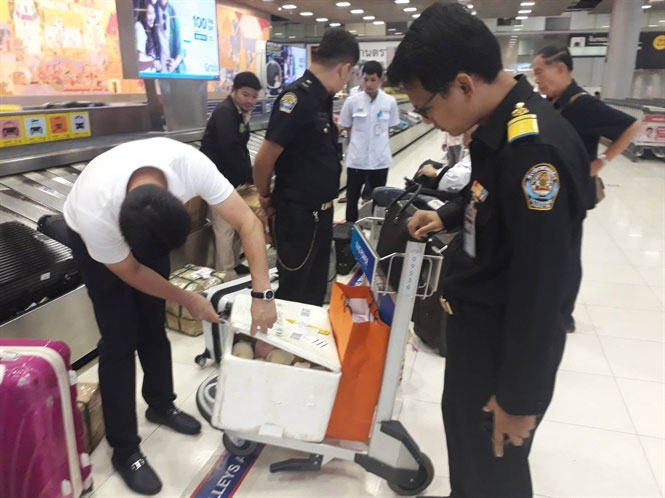The African cholera epidemic continues to be complicated
African Swine Ferver (ASF) is continuing to have complicated developments in China. Meanwhile, many Southeast Asian countries are finally deploying solutions to prevent the infection of this dangerous virus.
Over the past 3 years, African swine cholera has been continuously outbreaking in countries in the Caucasus Mountains and the southern part of the Russian Federation with the trend of increasing spread. The disease is happening in China and tends to spread quickly. The Food and Agriculture Organization of the United Nations (FAO) warns that the disease is likely to spread to countries in Southeast Asia, including Vietnam. On August 30, 2018, the Ministry of Agriculture and Rural Development has sent urgent messages to ministries, branches and provinces and cities across the country to implement measures to prevent the risk of penetrating African swine cholera into Vietnam.
Meanwhile in China, the epidemic continues to spread. Specifically, the first outbreak was published on August 3, 2018 in Liaoning province in northeastern China, the disease was detected on a small farm of 383 pigs, killing 47 after infected.

Thai authorities are tightening inspection, preventing pork and pork products from passengers entering the country.
The second outbreak was discovered on August 16, 2018 at a slaughter plant in Henan province, causing 30 pigs to die (pig origin was transported from Heilongjiang province, a northeastern province with 500 miles from the first case). From the gap between the two outbreaks, the virus may have spread to many places in China before the case was confirmed. The slaughter plant was soon closed, pigs were banned from transporting within 6 miles of the area and all pigs in the area had a radius of 2 miles (1 mile = 1.6 km) from the killing plant. surgery was destroyed .
As of September 3, 2018, African pig cholera continues to be discovered in many locations in China (mainly in the eastern provinces of the country) with a total of 7 locations detected. The 5th, 6th and 7th outbreaks were discovered in Anhui province from August 30 to September 3, 2018. According to China's Ministry of Agriculture, African swine flu has now killed and destroyed more than 38,000 pigs.
In South Korea, according to the Korean Times, the Ministry of Agriculture, Food and Rural Affairs has reportedly found the gene of the African swine flu virus in two processed pork products, brought along. of 2 tourists from Shenyang City, Liaoning Province, China. This is also the place where the first outbreak was recorded in China. South Korea's Customs Department conducts tests using a PCR reaction and detects the virus, but authorities are checking whether it is a live or dead virus. Immediately processed pork products are then processed at high temperatures, so there is little possibility of spreading pathogens to the Korean pig industry. However, this indicates that the problem of disease control is related to the control of viruses entering the country related to pig products through tourism routes.
In the Philippines, the government has just banned a ban on Chinese pigs and swine products, and countries have found African swine flu. Meanwhile in Thailand, the country has a temporary suspension order for at least 90 days for live pigs and slaughtered pigs from China and countries that detect African swine flu.
Currently, Thailand has implemented many ultimate measures to control infestation. In particular at airports and airports, propaganda posters on prohibitions and heavy penalties for carrying pork products have been deployed at airports. Professional dogs are mobilized to carefully control the luggage of passengers entering the country, especially the large number of tourists from China. In addition, Thailand has also strengthened measures for sampling and analysis to screen and detect African swine cholera virus for livestock farms as well as pig products, especially imported products. password
According to private sources of NNVN, CP (Charoen Pokphand Group) - 'big man' in Thailand's livestock industry has now aggressively implemented measures to protect the farming system of the spreading group. throughout Thailand as well as Vietnam. Accordingly, CP follows the recommendations of FAO as well as the Thai animal disease control authority on the prevention of African swine epidemic to spread to the entire farm system of the Group. Some measures have been given to farms by CP: Do not bring pork, food containing pork to the farm; do not use surplus food as food for pigs; treating drinking water for pigs in Chlorine 3-5 ppm before giving it; preventing flies and mosquitoes with preparations; antiseptic, bathing, shampooing, changing the camp's clothes and camp boots, dipping into the disinfection hole before going into the camp .
- Swine cholera threatens Asia
- Overview of cholera swine in Africa
- Cuba prepares a series of vaccines against African pig cholera
- Cholera pig in China can spread to other countries
- The worst cholera epidemic in history broke out in Yemen
- Find out where the cholera originates from the world
- Process of handling dead pigs due to disease
- Vietnam successfully produced vaccines for cholera swine in Africa
- Super-strong cholera bacteria are all from Asia
- Central: Dengue fever continues to increase
- Cholera epidemic raging in eastern India
- African Union seeks to deal with Ebola
 Green tea cleans teeth better than mouthwash?
Green tea cleans teeth better than mouthwash? Death kiss: This is why you should not let anyone kiss your baby's lips
Death kiss: This is why you should not let anyone kiss your baby's lips What is salmonellosis?
What is salmonellosis? Caution should be exercised when using aloe vera through eating and drinking
Caution should be exercised when using aloe vera through eating and drinking